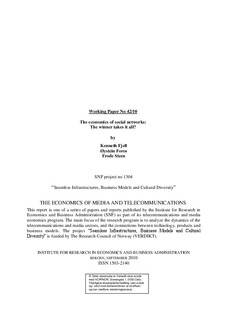| dc.description.abstract | We look at the economics of social networks. Key economic features of these are positive network effects, giving rise to positive feedback effects that may lead to a winner-takes-it-all market. Social networks’ revenues are collected from online advertising; social networks thus constitute two-sided markets. Two-sided markets with ad-financing enhance the winner-takes-it-all effect. However, for many young people, social networks are parts of their image. They may want to be where the right people are, not where all people are. Social networks are virtual communities, places to meet other people. As for offline communities, e.g., nightclubs, it may be important to be a part of a new and trendy community. This may give rise to negative network effects – so-called snob effects; a consumer wants an exclusive or unique product or service. Such a night-club-effect opposes the positive network effects, and may thus limit the winner-takes-it all feature of social networks, suggesting that a ‘Facebook-monopoly’ is not necessarily the most likely scenario. | en |
